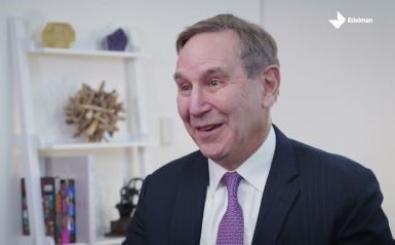As Europe juggles the first wave of the pandemic and a looming economic crisis, Germany, the EU’s largest and most influential Member State, is assuming the Presidency of the Council of the European Union. Tasked to set the agenda and direction of its key institutions for the next six months, the German Presidency is focused on a clear motto: “Together for Europe’s recovery”.
While the European Union was slow to appreciate the challenges and consequences of the pandemic, it is now abundantly clear to the European Commission, the European Council and important leaders in Berlin and Paris that COVID-19 is, without doubt, the largest challenge faced by the region since its creation. And importantly there is now recognition that such a challenge can only be addressed with joint efforts at EU level through an unprecedented set of economic measures.
With this backdrop, it is not surprising that the German Presidency’s key priority will be to control the pandemic, govern its consequences and work towards a sustained economic recovery. Germany will have the possibility to set the pace of conversation on the European Commission’s proposal on the Recovery Plan for Europe, the Next Generation EU, and the Multiannual Financial Framework (MFF), which, if approved, would account for a total of € 1.85 trillion to support the recovery of the European economy. Berlin is full speed behind the Recovery Plan and is expected to leverage the first months of the Presidency to achieve consensus among Member States for an adoption before the end of 2020, with the objective of unleashing the resources as of 1 January 2021.
The adoption of the Recovery Plan by the end of the year would represent an important win for the German Presidency; however, Germany will have other opportunities to demonstrate its leadership and shape the European Union, namely its “Europe First” strategy. Baked in the Union’s ambitious Green Deal and the data strategy is the idealism that the continent has lacked for many years now. On the former, Germany aims to reach an agreement on raising the EU’s 2030 climate target and finalise Member States’ decisions to enshrine climate neutrality by 2050 in an EU climate law; on the latter, the focus will be on promoting the EU’s digital sovereignty, by boosting the bloc’s digital infrastructure and tech competencies.
Ensuring both projects stay intact despite the challenges of COVID-19, will be a key priority for the German Presidency, especially with the arrival of the geopolitical age. Disinformation and human rights with China, trade issues with the United States, military expansionism with Russia and a complex web of issues with Turkey, are all in urgent need for discussion and possibly action. The Commission President had promised a more “geopolitical” Commission, but to date the challenges have mounted without a clear strategy and direction to tackle them. All eyes will rightly be on Berlin as it aims to rally a nervous Europe to get both its house and neighbourhood in order. If economic certainty is step 1, the strategic vision will certainly be step 2 for this Presidency.
The German Presidency will also aim to manage Boris Johnson’s deadline “bluff” which has been set for the end of this year. Since the UK left the EU on 31 January 2020, the progress in negotiations has been limited. As the UK aims to conclude negotiations in October, the German Presidency will hold responsibility to align Member States’ positions around a possible compromise.
This will be a challenging time for the European Union, but having Germany leading the charge will be welcome across Europe.
“The German Government knows that COVID-19 represents the biggest challenge since the creation of the European Union and that such challenge can be addressed only with joint effort at EU level and an unprecedent set of measures.”
— Gurpreet Brar
However, the German Presidency cannot be fully understood without considering the internal state of German politics. Germany assumes the Presidency under Chancellor Merkel’s credo that the country “will only prosper if Europe prospers”. Such avowals could have been judged as mere lip services a few years ago, as Germany was pursuing a reserved approach to EU-wide investments, favouring the status quo. But the current crisis leaves Germany with no alternatives. As Berlin faces its biggest recession in post-war history, the government even shifted away from its traditional balanced budget policy (“black zero”) by agreeing on a €130 billion domestic stimulus package which puts private and public investments at its core.
This new paradigm has been long in the making. The German coalition government between the Christian Democratic Union (CDU) and Social Democratic Party of Germany (SPD) under Merkel’s leadership has been lamented for lacking vision. Even leading German economists and the business community have increasingly started to openly question the Government’s fiscal policies. Many voters became disenchanted with the governing parties and Merkel’s approval ratings reduced significantly. However, in the last few months the Chancellor’s management of the pandemic and her constructive approach to the European project, led her ratings to surge importantly, with her party CDU nearing almost 40 per cent. This translates into a vast political capital that Merkel will try to leverage to leave a lasting legacy when she retires at the German federal elections next year.
“The German Presidency already had its first historical moment before it really started. The Franco-German proposal in May to create a recovery fund for solidarity and growth that was then expanded upon by the European Commission prepared the ground for the German Presidency to act. Not only for Europe’s recovery in the short term – but also for Europe’s future.”
— Bärbel Hestert-Vecoli
As Europe tries to recover from the COVID-19 crisis, the next six months have the potential to change significantly the political and policy environment in which businesses operate. And the German Presidency is going to be one of the key engines governing and driving such change on the Brussels-Berlin axis. If you are interested about how the priorities of the German Presidency may affect your organization, then get in touch. With our offices in Brussels and Berlin, at Edelman we have a full suite of services that can help you navigate these policy developments and ensure you are effectively communicating during these times. Also, stay tuned as in the coming days we will be sharing a set of snapshots outlining the priorities of the German Presidency in a number of key sectors.
Gurpreet Brar is the COO of Edelman’s Global Public Affairs Practice and the General Manager of Edelman Brussels.
Bärbel Hestert-Vecoli is Managing Director of Edelman’s Corporate Reputation Practice in Germany.






